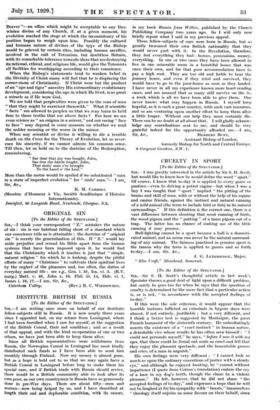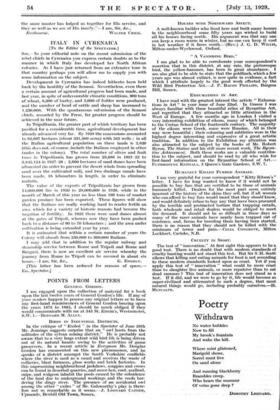[To the Editor of the SPECTATOR.] SIR,—Sir S. H. Scott's
thoughtful article in last week's Spectator throws a good deal of light upon a difficult problem, but surely he goes too far when he says that the question of cruelty is determined by the mere fact that a particular action is, or is not, " in accordance with the accepted feelings of to-day."
If this were the sole criterion, it would appear that the horrible tortures inflicted on criminals in bygone days were almost, if not entirely, justifiable ; but a very different, and I think a better test is suggested by Montaigne, the great French humanist of the sixteenth century. He unhesitatingly asserts the existence of a " cruel instinct " in human nature, a detestable vice whose results he has often seen himself : " I could not persuade myself," he says, " before I saw it with nib/ eyes, that there could be found out souls so cruel and fell that they enjoy the pleasant spectacle, and the lamentable groans and cries, of a man in anguish."
His own feelings were very different : " I cannot look so much as upon the ordinary executions of justice with a steady eye," and although he enjoyed hunting, he " cannot without impatience (I quote from Cotton's translation) endure the cry of a hare in my dog's teeth, though the chase be a violent pleasure." He felt, however, that he did not share " the accepted feelings of to-day," and expresses a hope that he will not be laughed at for his sympathy with " beasts," inasmuch as " theology itself enjoins us some favour on their behalf, slims the same master has lodged us together for His service, and they as well as we are of His fami.iy."I am, Sir, &c.,

































 Previous page
Previous page